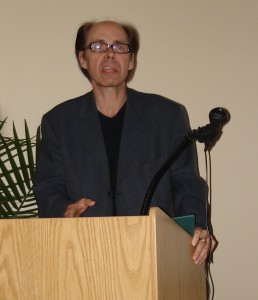On Saturday 1 May, I attended a SkillBuild in High Point, NC. This event, co-sponsored by the High Point Public Library and the Murder We Write chapter of Sisters in Crime, showcased excellent workshops by Lee Lofland, Chris Roerden, and headliner Jeffrey Deaver. To do justice to the power of these workshops, I won’t attempt to squeeze accounts of them into a single blog entry. So stay tuned to my blog for scoop on this SkillBuild.
 “People Don’t Read to Get to the Middle: Writing a Page-Turning Thriller” was the title of the workshop by Jeffrey Deaver. This bestselling, award-winning author discussed the principles that guide him when he writes, and he shed light on the process by which he produces his thrillers.
“People Don’t Read to Get to the Middle: Writing a Page-Turning Thriller” was the title of the workshop by Jeffrey Deaver. This bestselling, award-winning author discussed the principles that guide him when he writes, and he shed light on the process by which he produces his thrillers.
“Who brushed their teeth this morning?” Deaver asked the audience. Following a show of hands, he produced a series of questions. “Who used mint-flavored toothpaste? Who used cinnamon-flavored toothpaste?” He drilled down to make his point about Guiding Principle One by asking a final question: “Who used liver-flavored toothpaste?” Of course, no one uses liver-flavored toothpaste. The manufacturers of major toothpaste brands are smart enough to not produce a product that no customer wants to use.
Writers are also manufacturers of a product. They should be smart enough to not write stories that readers don’t want to read.
Writers should continually perform market research and ask themselves, “What do my readers want?” then write clear, coherent stories for their readers. Easy for Jeffrey Deaver to say. He isn’t caught up in the angst of finding an agent or publisher
Here’s what Deaver means with his first guiding principle. If you’re a writer, and you want to create fiction that’s saleable, throw your ego out the door. This business isn’t about you. It’s about writing to your audience. Deaver counts himself very lucky to be making a living off his writing. He achieves that by understanding what his readers want, then giving it to them. He cannot afford to cave to his ego.
Literary agents and publishers often cite the fact that few first manuscripts are saleable. There’s a reason why they aren’t. Most of the time, that first novel isn’t for readers. It’s for the writer. It’s autobiographical and strokes his or her ego by bringing out all the personal baggage.
What is this baggage? Misery over being unpopular in high school, misery over being raised by parents who failed to meet your expectations, and so on. To deliver a story about baggage, your first novel becomes a plotting and characterization debacle that undermines delivery of a story with appeal to a broader audience.
In other words, your personal baggage on the page is liver-flavored toothpaste. Nobody wants to buy your liver-flavored toothpaste. Deal with it.
Understand that there’s nothing wrong with writing an autobiographical first novel. You’ve heard the saying that there’s a novel in everyone? That’s the autobiographical manuscript, and it’s great therapy to write it. Furthermore, actually completing a first draft is a major achievement! Most writers never get that far. Congratulations if you’ve finished a first draft.
However, if you’ve completed that first manuscript, and you have your cap set on this writing business, your next step toward making a living as a professional author of fiction will almost always be to put that first manuscript away on a shelf or in a drawer and start writing your next manuscript. With each successive manuscript, you leave more autobiographical baggage behind, and you acquire more of the craft of writing.
Almost every published author has a bunch of unpublished manuscripts stashed away. I shoved away two unpublished partial manuscripts and nine unpublished completed manuscripts prior to finishing my tenth manuscript, my award-winning first novel, Paper Woman. I ditched the autobiographical baggage in my partials and first finished manuscript. The subsequent completed, unpublished manuscripts are where I developed my craft, learned the business of understanding my audience, and became publishable.
Heck, yes, this takes time. Decades in my case. Maybe you won’t take decades to create a publishable manuscript. But you must still invest in that time-consuming learning process if you want to be published. Painters, composers, and sculptors don’t expect their first creations to sell.
People often ask me whether I plan to return to my unpublished manuscripts and fix them, make them saleable. No. Like many authors, I’ve cannibalized pieces of some of them. But each one is, as a whole, a tube of liver-flavored toothpaste. They’re bombs that I wouldn’t inflict upon my readers, kind people who have so many options for how they spend their leisure time, and they choose to spend it in my fictional universe. I’m grateful for them.
How many tubes of liver-flavored toothpaste do you have shoved away in a drawer?
**********
Did you like what you read? Learn about downloads, discounts, and special offers from Relevant History authors and Suzanne Adair. Subscribe to Suzanne’s free newsletter.
